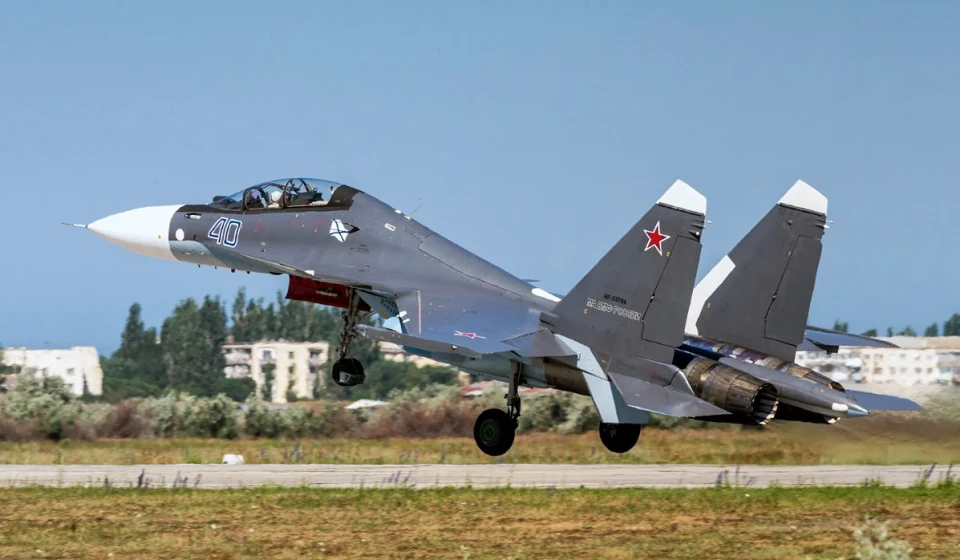
How Kazakhstani shell company aids Russian military in servicing Su-30SM aircraft with French equipment
InformNapalm, an international intelligence community, reveals a scheme allowing Russia to continue servicing its military aircraft using French equipment, spare parts, and technology despite international sanctions
Volunteers from InformNapalm collected documents and testimonies exposing a collaboration between the Kazakh company ARC Group and the Russian military to maintain Russian Su-30SM aircraft equipped with French avionics from Thales and Safran. This example of Russo-Kazakhstani cooperation highlights how Russia accesses advanced military technology despite Western sanctions through a Kazakhstani military contractor.
Thales and Safran
As of 2024, Russia possesses up to 130 modernized Su-30SM 4++ generation fighters. During the invasion of Ukraine, Russia lost at least 15 of these aircraft. The Su-30SM aircraft rely on foreign-made avionics from French companies Thales and Safran (formerly Sagem). These aircraft are equipped with critical components like SMD55S and SMD66S multifunctional LCDs, TLS2020 multi-mode receivers, TACAN-NC12 tactical navigation systems, HUD 3022 head-up displays, and SIGMA 95NAA high-precision inertial navigation systems, manufactured by the aforementioned companies. Without these systems, the aircraft would be effectively non-operational. Although Russia planned to replace this French equipment, the process has been slow, with only limited advancements by 2024. The screenshot from May 2024 shows the French HUD 3022 being replaced by the Russian IKSH-1KI.
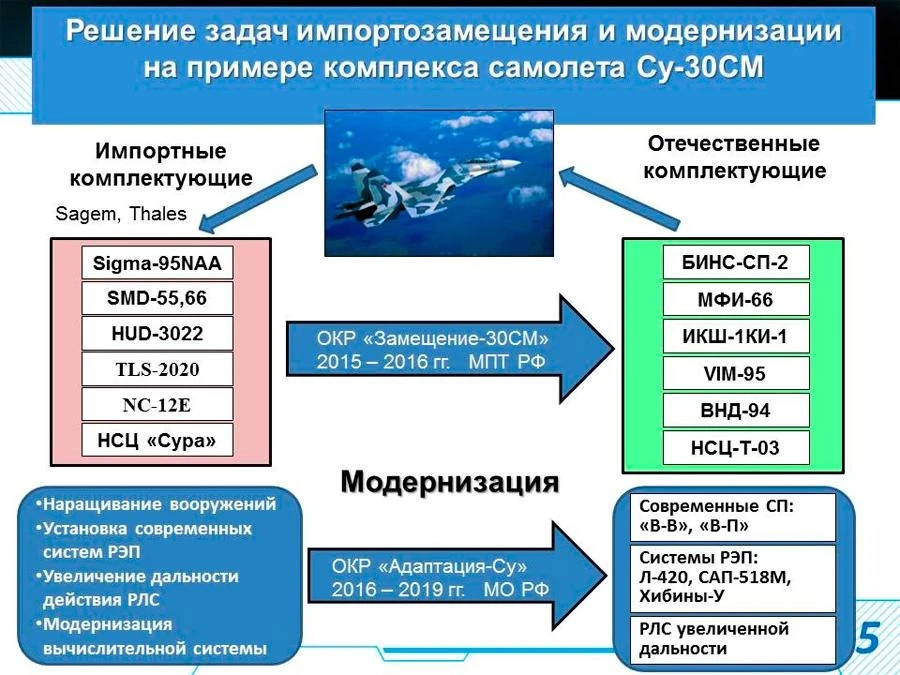
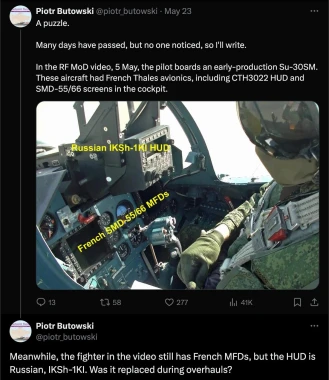
To keep these aircraft operational, the Russian military must continually maintain the French equipment. However, sanctions have impeded Russia’s access to the specialized personnel and certified tools needed for this task. The documents gathered by InformNapalm suggest that Russia found a solution: bypassing sanctions through a Kazakh contractor.
ARC Group LLC
The Limited Liability Company Analyst Research Consulting Group (ARC Group) was founded in Kazakhstan in 2014 by Aldanazar Sagynbek [Kaz: Сағынбек Алданазар Дарханұлы], born on February 3, 1998.
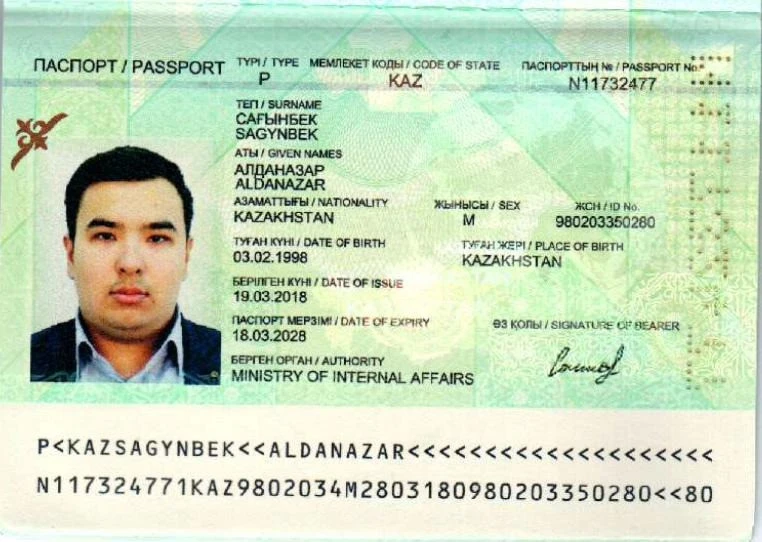
Remarkably, Sagynbek established this consulting firm at just 16 years old.
From the start, the company's operations appeared suspicious. According to Kazakhstani data sources, ARC Group employs only five people. Its website, https://arcgroup.kz/, provides a brief general description and contact information but offers limited details about its operations. However, it notes that since 2016, ARC Group has held a state license from the Committee for Industrial Development and Industrial Safety of the Ministry of Industry and Infrastructure Development of Kazakhstan. This license authorizes the company to export, import, install, modernize, and maintain aviation equipment and spare parts.
The documents acquired by InformNapalm suggest that ARC Group is serving as a front company, enabling Russia to bypass sanctions.
Sanctions-Dodging Scheme
In October 2021, ARC Group signed its first contract with a specialized Russian company, Rosaviaspetskomplekt, whose name stands for “repair, maintenance, supply of special components for aviation” in Russian. The contract, dated October 25, 2021, explicitly outlines the provision of services for the maintenance and supply of aviation radio-electronic equipment components manufactured by THALES and Safran for Su-30 aircraft. A critical clause in paragraph 1.2 states that the maintenance of avionics would be performed by certified specialists of ARC Group, either in Kazakhstan or Russia, using manufacturer-certified equipment.
The contract annex listed military products imported into Kazakhstan in 2021, including navigation and situational awareness devices like SMD55S, SMD66S, TLS2020, TAC-NC12, HUD 3022, and SIGMA 95NAA, intended for temporary overhaul with subsequent re-export to the Russian Armed Forces.
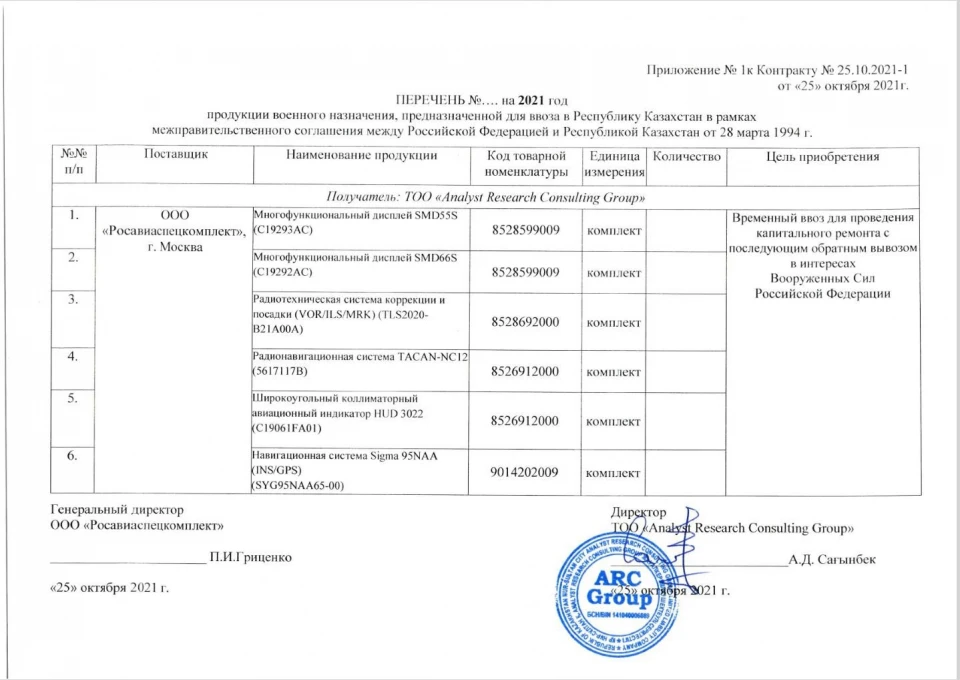
Although the initial contract was never signed by the Russian side, a new agreement (Contract No. 05.11.2021-1) was finalized on November 5, 2021. This version avoided explicit mention of French companies, generically referencing “maintenance of aviation equipment.”
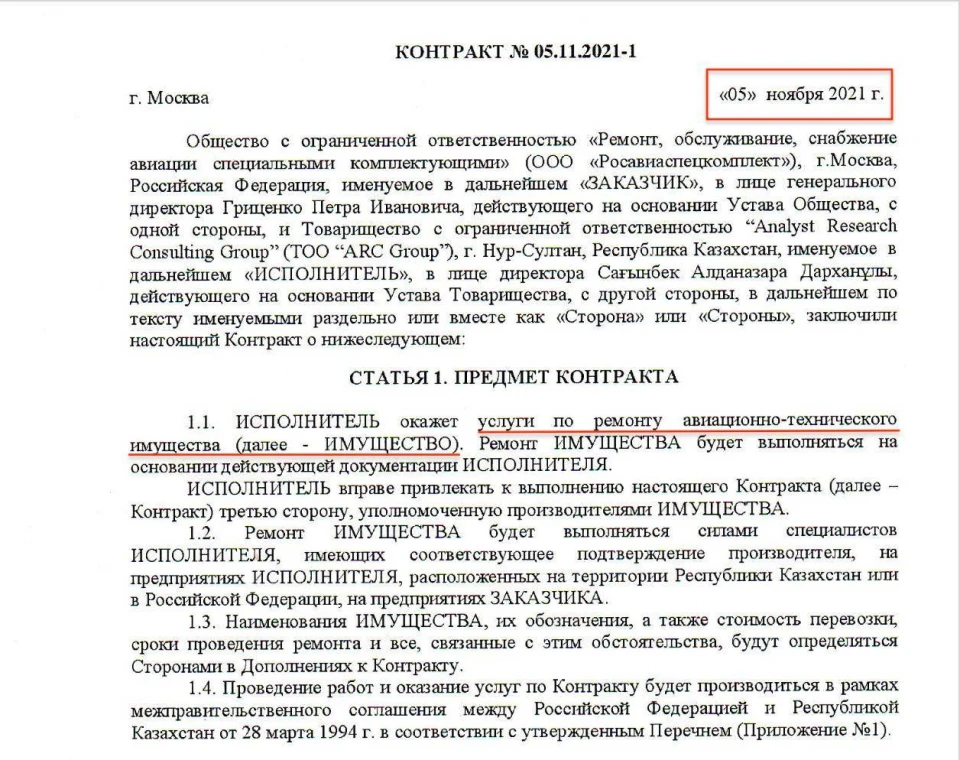
The key components and references to the Russian military remained, but the planned import period was shifted to 2022.
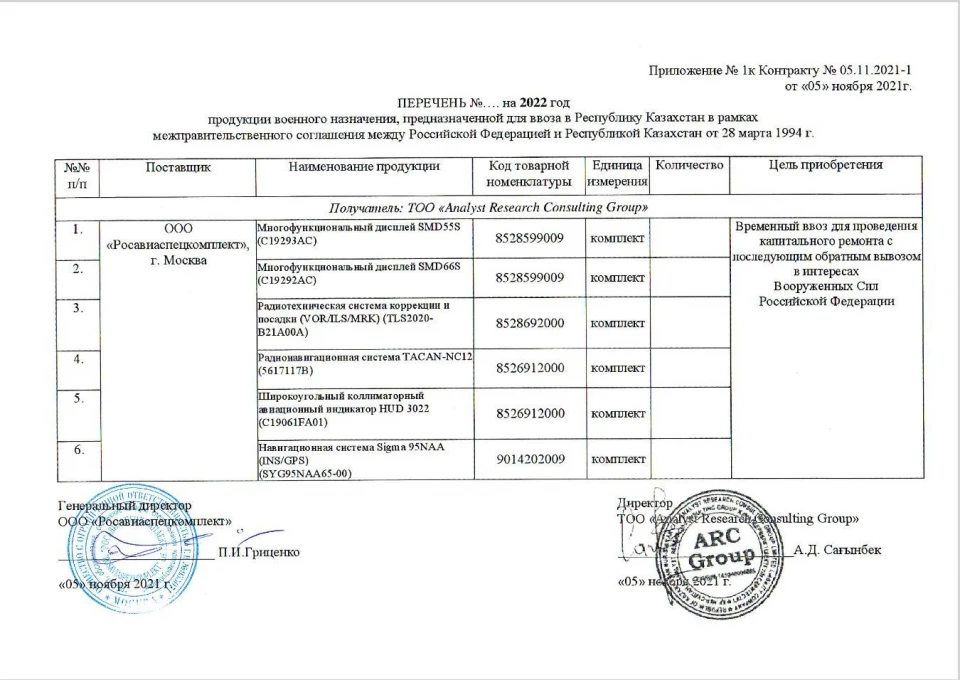
This development raises two possible explanations. First, Russia may have anticipated tightened sanctions before its full-scale invasion of Ukraine and set up ARC Group as a sanctions-dodging mechanism, ensuring it was certified by French manufacturers. Second, the contract could have been backdated, with real operations beginning after Thales withdrew from the Russian market in June 2022, following tougher sanctions.
Support for the second theory comes from an August 26, 2022, letter from Rosaviaspetskomplekt’s director, Petr Gritsenko, to the Kazakhstani company. The letter outlines plans to service 13 units in 2022, valued at €1,450,000, with a jump to 88 units in 2023, worth €6,420,000. Despite signing the contract in November 2021, Rosaviaspetskomplekt still lacked exact figures nine months later, suggesting the practical relationship between the companies began in mid-2022, after Thales left Russia.
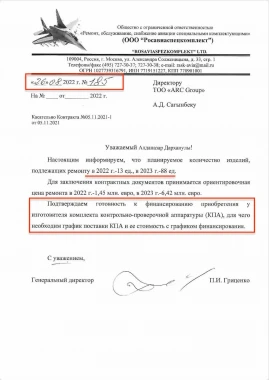
Additionally, the letter reveals that Russia was willing to finance the purchase of automated test equipment from the French manufacturer, enabling ARC Group to perform diagnostics on French components used in Russian aircraft. This highlights a significant escalation in cooperation between the two companies.
As the years progressed, the scope of the agreement expanded, with four annexes added to the contract in 2022, 2023, and 2024.
InformNapalm plans to make the related documentation publicly available to provide further insight into this sanctions-evading scheme.
Training at Thales
Annex No. 3 of the contract signed in October 2022 outlines the basis for the contract pricing, specifying that the maintenance price includes:
- Training of specialists by the manufacturer (the French);
- Technical diagnostics of products with a subsequent report;
- Development of technical documentation for Automated Test Equipment (ATE);
- Development, manufacture, supply, installation, and commissioning of the ATE.
“In other words, the Russians pay for the provision of a full cycle of services – from training and certification of Kazakhstani specialists in France to purchasing the necessary equipment from the French,” InformNapalm explained.
Upon receiving funding from the Russians, the Kazakhstani consulting company arranged for its specialists to be trained in France. The head of ARC Group notified Petr Gritsenko in a letter dated December 9, 2022, of the training schedule: "From January 16 to 20, 2023, as part of our contract with the French company Thales, our specialists will undergo training in servicing various avionics systems."
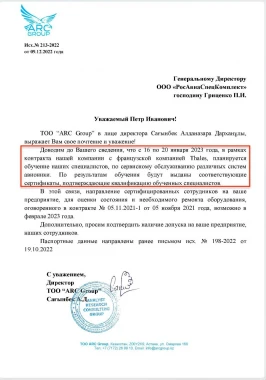
The same letter also mentioned the initial schedule for Kazakhstani specialists' arrival at Russian plants—February 2023, right after the training. On January 23, 2023, Aldanazar Sagynbek informed Gritsenko that their specialists had completed a theoretical and practical Organizational Level Maintenance (OLM) course at Thales for SMD 55S/66S and HUD units, with their qualifications certified.
Specific visit dates for the trained team to Russia were later set: February 6 to 10, 2023.
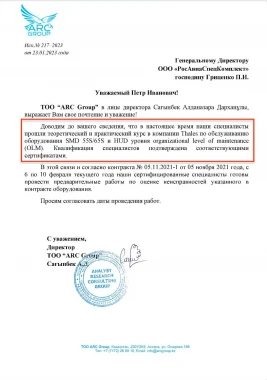
On the same day, the Kazakhstani side, under pressure, sent a second letter detailing the flight routing of their specialists from Astana to Irkutsk, the location of the Russian aircraft repair plant.
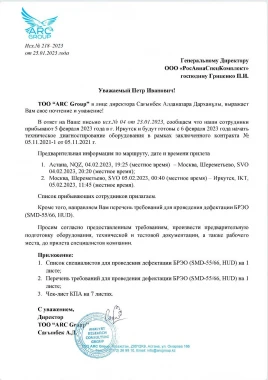
The identities and positions of the specialists servicing the Russians' equipment were confirmed through access to Russian database archives. The team included:
- Aldanazar Sagynbek, Director of ARC Group
- Ismagulov Kairat (Advisor to the Director)
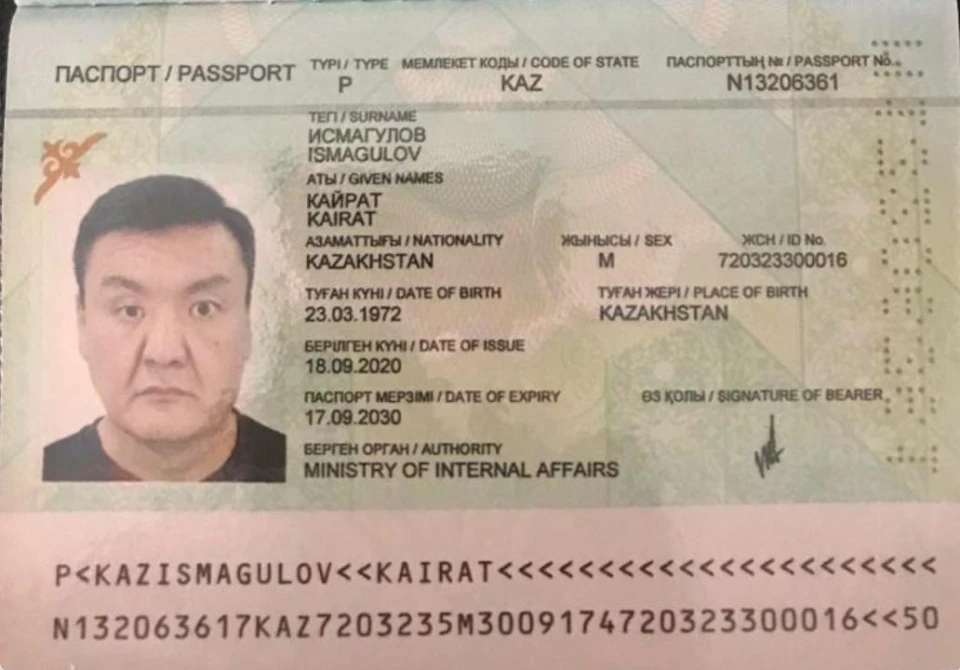
- Anwar Hassan Ahmed Badhaiduh (Deputy Chief Technologist – Engineer for Aviation and Avionics)
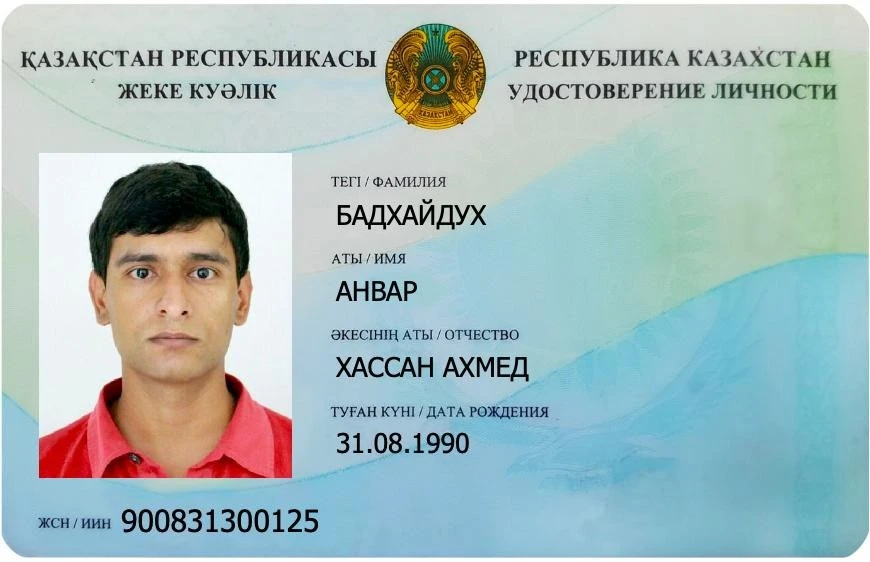
- Andrey Salnikov (Radio Mechanic for Avionics Maintenance)
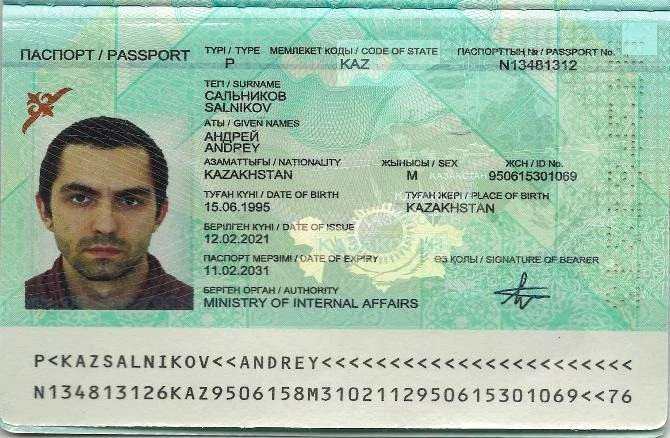
- Maxim Sharbekov (Radio Mechanic for Avionics Maintenance)
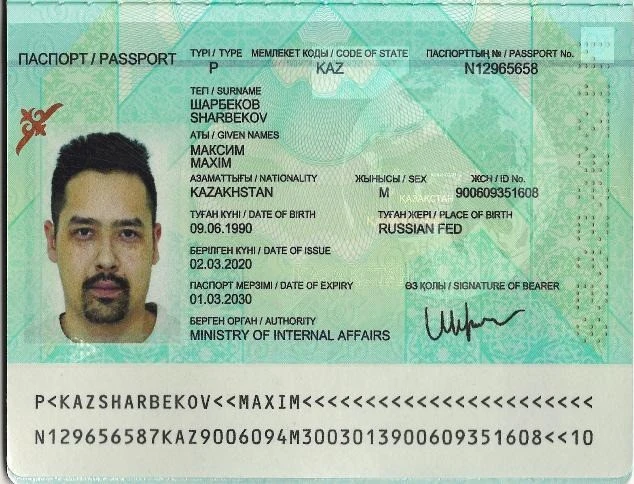
- Alexey Petrashko (Manager)
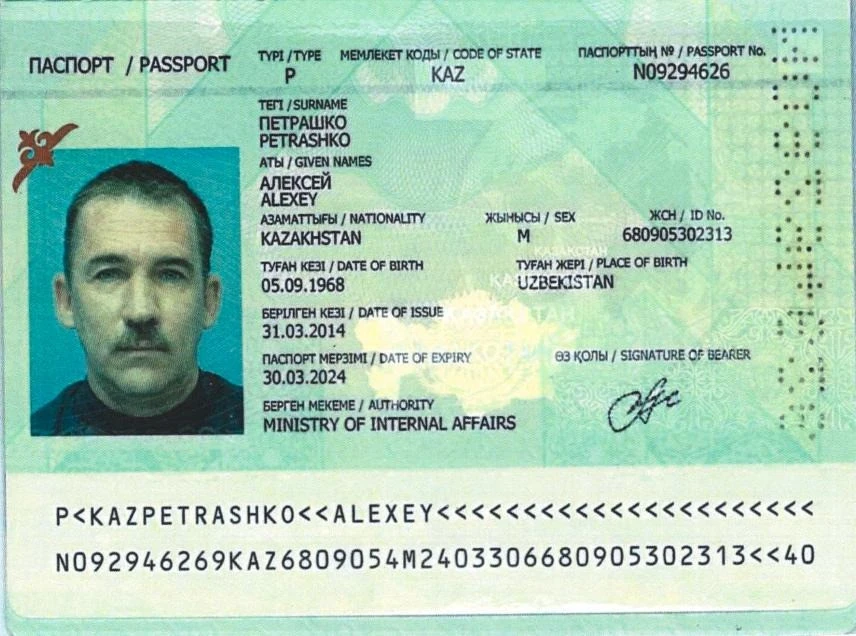 Two additional individuals later joined the list:
Two additional individuals later joined the list:
- Ushakov K.V. (Expert)
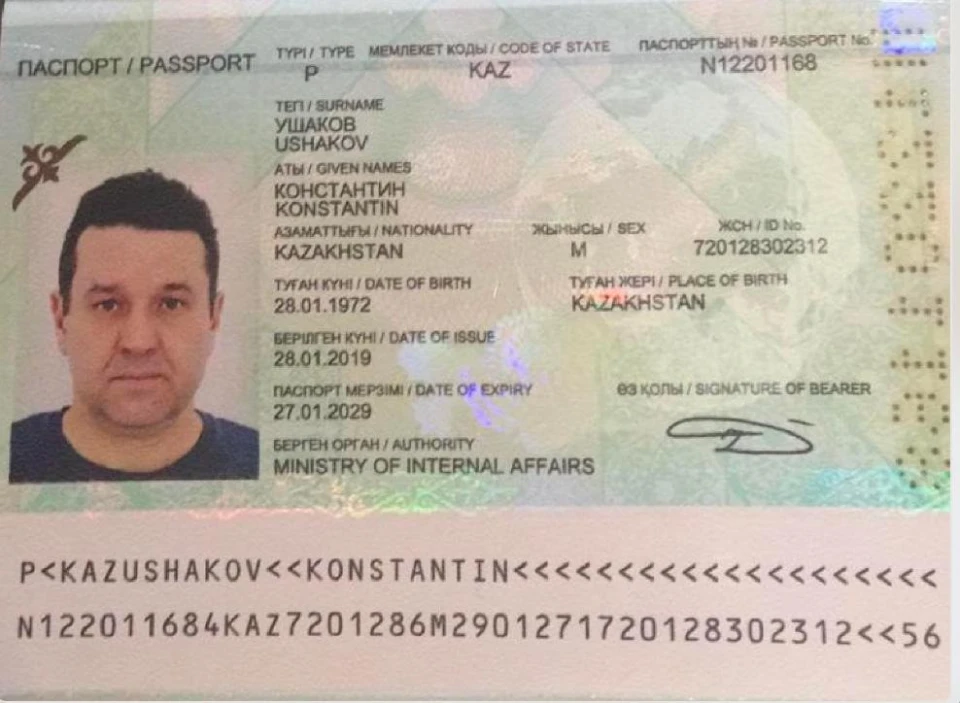
- Gribov M.S. (Senior Government Relations Specialist for the Russian Federation)
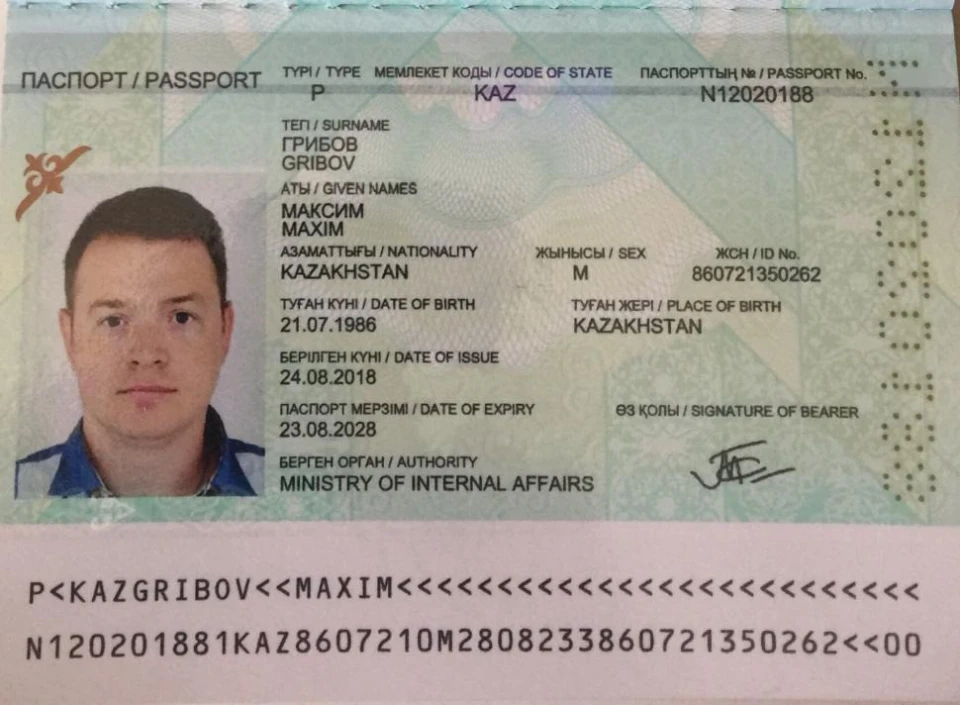
Given the planned scope of maintenance and repairs, the visits were not one-time events. For example, in April 2023, Gritsenko informed Sagynbek about a new stage of equipment diagnostics scheduled for May 2023. The Russian counterpart requested that the specialist group remain unchanged to avoid delays in security clearances at the restricted Irkutsk aircraft repair plant.
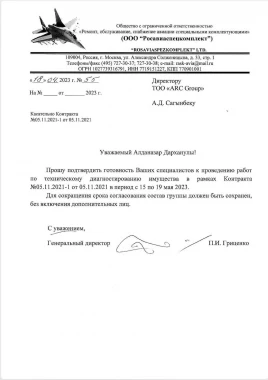
Contract with Thales
InformNapalm’s investigation reveals that the collaboration between Kazakhstani ARC Group and Rosaviaspetskomplekt has been ongoing for at least two years, during which the Kazakhstani company has misled the French side.
In 2024, a more troubling development has emerged. It turns out that the Russians are not only interested in acquiring specialists but are also financing the Kazakhs to purchase diagnostic equipment for French avionics used in Russian aircraft.
The investigation has obtained a draft contract between Thales AVS France SAS and JSC Aircraft Repair Plant No 405 (located at 13 Zakarpatskay Street, Almaty, Republic of Kazakhstan).
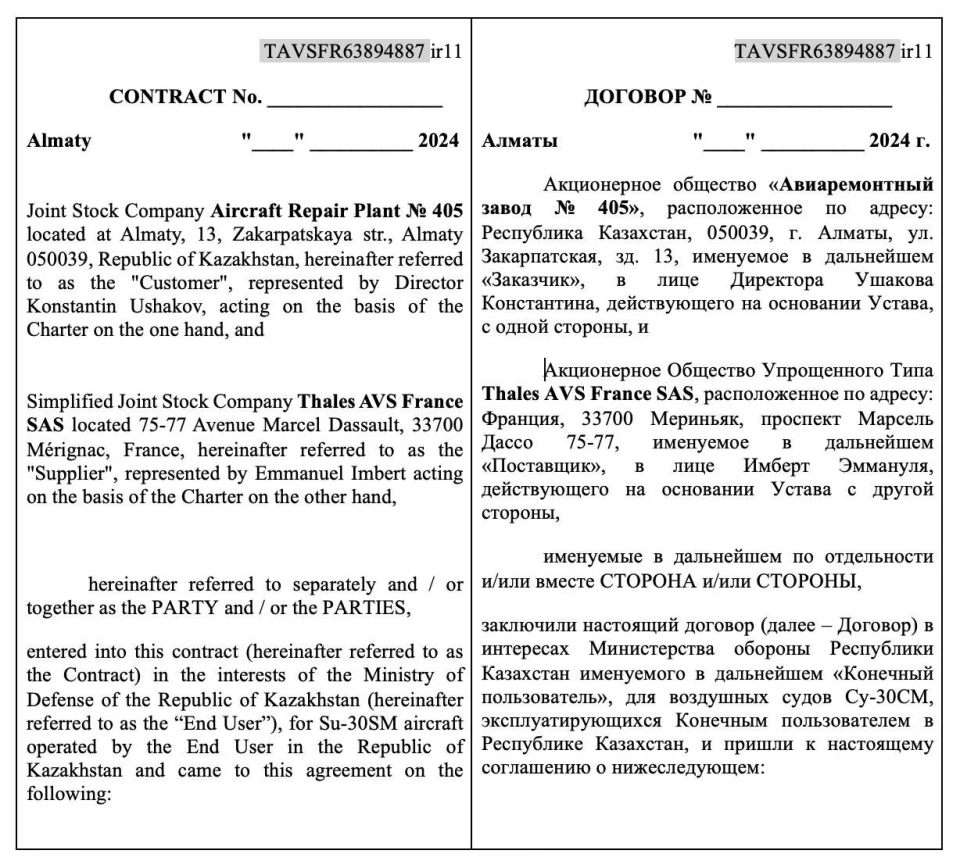
The contract outlines a full range of services from the French side for the maintenance of SMD55S/SMD66S multifunctional LCDs and HUD3022 head-up displays, intended for the Ministry of Defense of Kazakhstan, which operates Su-30SM aircraft. The key components of the contract include:
- Development and delivery of ILM&OLM Test Benches with three years of support;
- Development and delivery of Golden LRU;
- Preparation and delivery of ILM technical documentation;
- Preparation and delivery of ILM training in France;
- Installation and commissioning in Kazakhstan.
Note: ILM stands for Intermediate Level Maintenance.
The contract is set for a duration of 34 months from the date the supplier receives the advance payment and includes a visualization of the equipment to be installed and commissioned by French specialists at the Kazakhstani plant. It also features stringent export control provisions explicitly prohibiting the transfer of any goods to the Russian Federation.
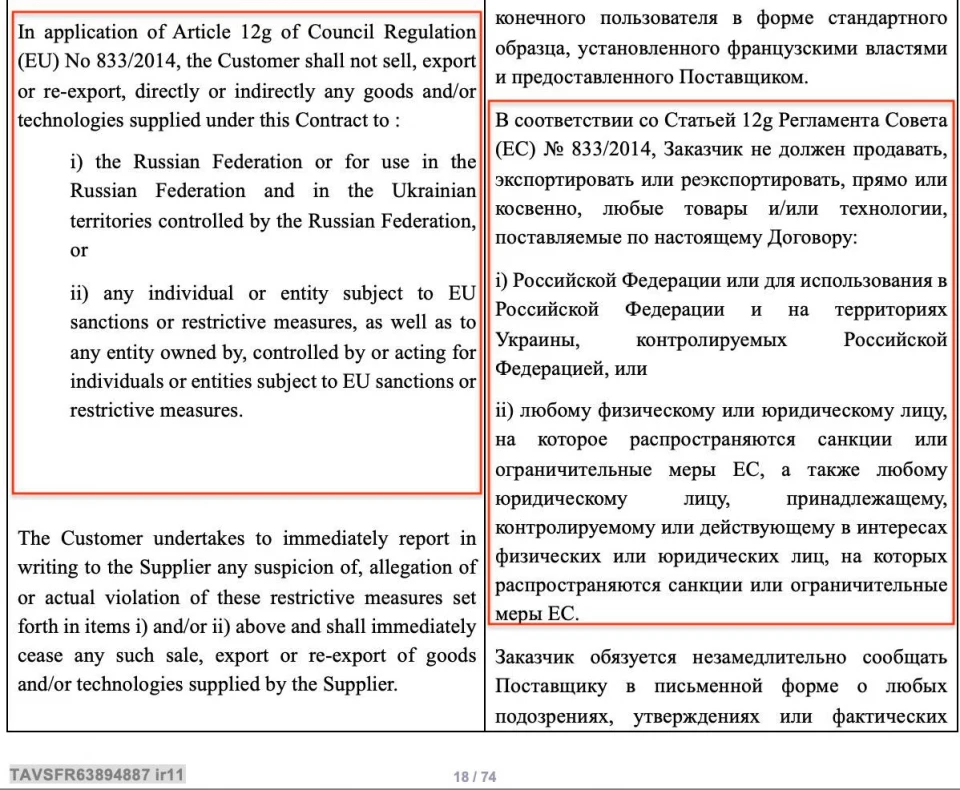
Given that Kazakhstan has 23 Su-30SM aircraft and another 36 on order, one might question whether this contract is truly for the benefit of the Kazakh military or if it serves Russian interests. A key indicator is a commercial offer from ARC Group to the Russians, which mirrors the terms of the Thales contract with JSC Aircraft Repair Plant No 405. On June 26, 2024, ARC Group sent a commercial offer to the Russians amounting to €13,826,199.26. Remarkably, this offer reflects nearly identical terms and timelines as the Thales contract.
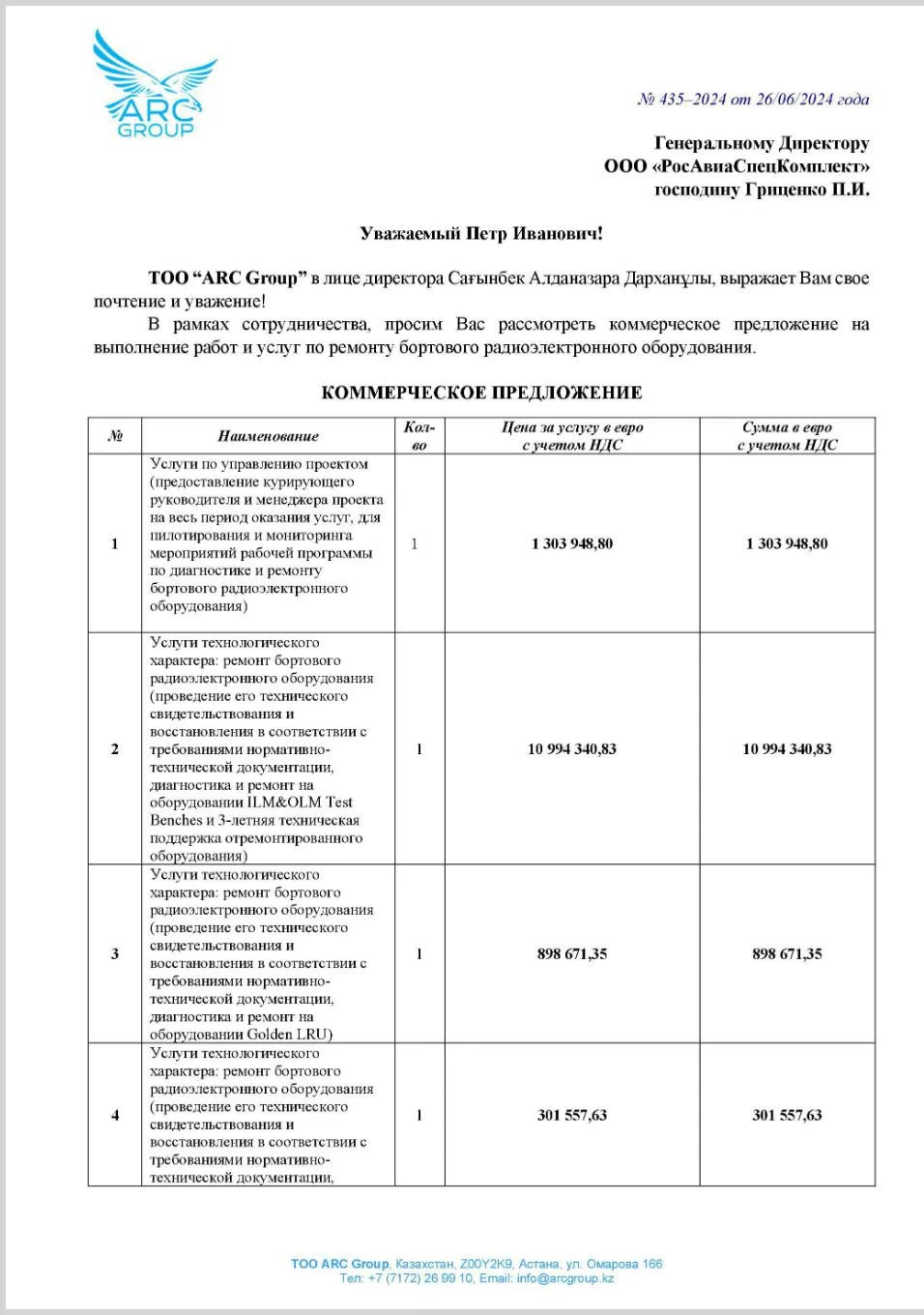
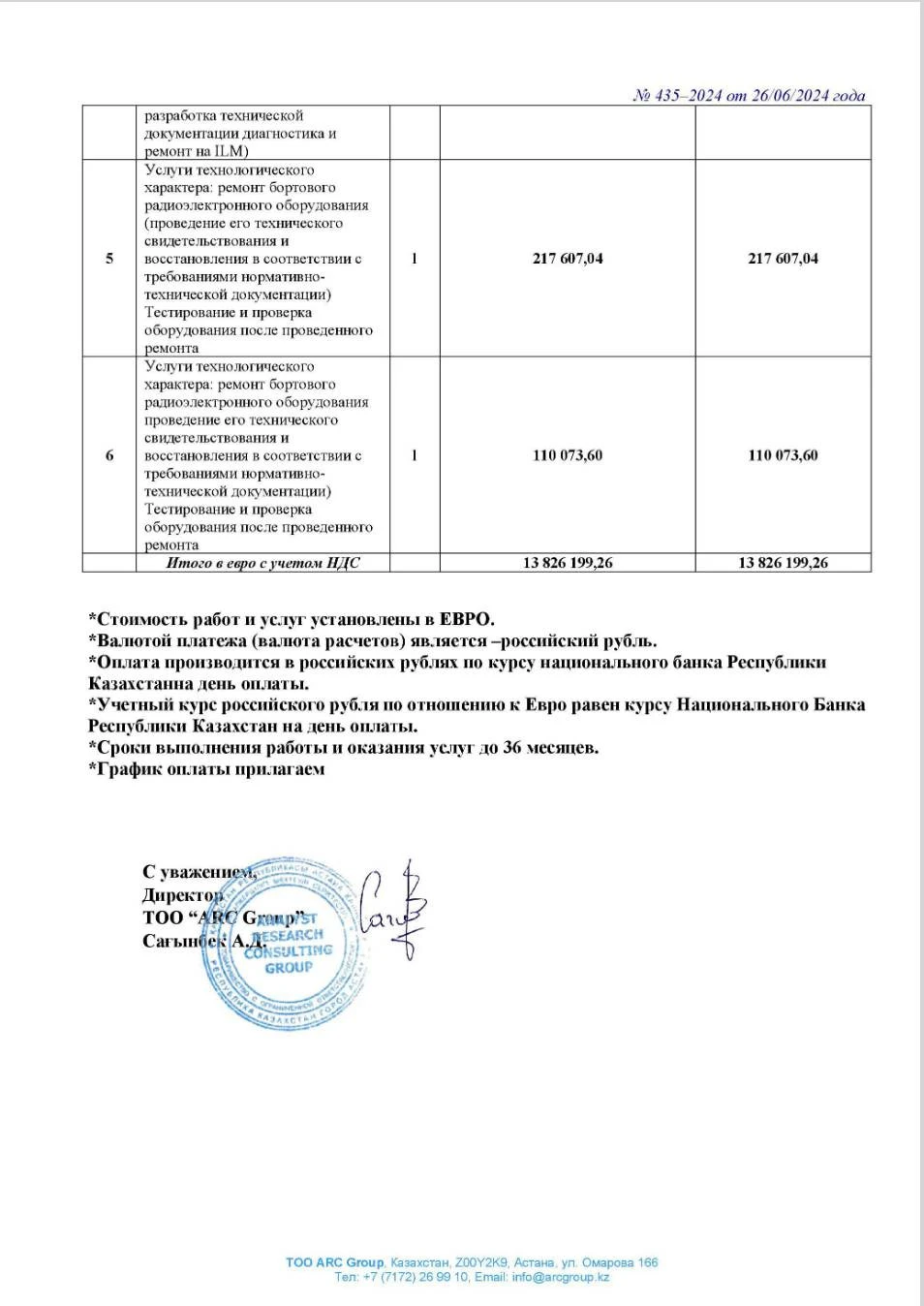
-
You can find the full version of the contract between Thales AVS France SAS and JSC Aircraft Repair Plant No 405 and the full version of the commercial offer from ARC Group to Rosaviaspetskomplekt on InformNapalm.
Conclusion
This investigation reveals how a Kazakhstani shell company assists the Russian military in servicing high-tech French equipment. The French companies Thales and Safran should be aware that their counterparts are engaging in deceitful practices, signing agreements to prevent the transfer of goods while secretly fulfilling Russian requests. Hopefully, this situation prompts more than just contract termination and license revocation, as French companies are entitled to compensation for their resources.
InformNapalm plans further publication of the full documentation that will shed more light on this Russian sanctions-dodging scheme.
- News






